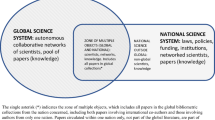Abstract
Technology innovation is an increasingly globalized exercise with dramatic consequences for scientific and diplomatic goals alike, and requires enhanced participation and integration of scientists and science-minded diplomats within diplomatic missions to advance shared policy goals. This more general problem is addressed in the present article by focusing on recent collaborations between U.S. and German scientists, including several of the coauthors.

Similar content being viewed by others
References
Gluckman PD, Goldson SL, Beedle AS (2012) How a small country can use science diplomacy: a view from New Zealand. Sci Dipl 1:2
Hellström T (2003) Systemic innovation and risk: technology assessment and the challenge of responsible innovation. Technol Soc 25:369–384
Kezar AJ, Sam C (2010) Understanding the new majority of non-tenure-track faculty in higher education: demographics, experiences, and plans of action. Jossey-Bass 36:1
Lexow W (1966) The science attaché program. CIA Historical Review Program, Washington, DC
Linkov I, Trump BD, Tatham E, Basu S, Roco M (2014) Diplomacy for science two generations later. Sci Dipl 3:1
Loftness R (1955) Why science attachés? Sci Month 80:124–127
Longstanding partners in changing times: report of the task force on the future of German–American relations. German Marshall Fund of the United States (2015)
Neureiter NP (2008) Successes in building international bridges through science. In: Schweitzer G, Sobouti Y (eds) Science as a gateway to understanding: international workshop proceedings, Tehran, Iran. National Academies Press, Washington, DC
The National Academies (2015) Role of science and technology should be expanded throughout department of state. News from the National Academies, Washington, DC
Weber RH, Weber R (2010) Internet of things. Springer, New York
Acknowledgments
This article represents the collective discussions of two panel sessions held at the Embassy of Germany in Washington, DC in December 2014 and January 2016. Thanks are due to the two science counselors, Dr. Andrea Noske and Dr. Karsten Hess, at the German Embassy, who helped to organize and participated in the panel discussion. Thanks are also due to Mr. Joshua Trump for his editorial assistance with this paper. Igor Linkov and Sankar Basu participated in the Science Fellows Program at the U.S. Embassy in Berlin; their views and opinions within this article are derived from discussion and experience working with the U.S. Department of State personnel engaged in the program. Nancy Jackson shared her past experience as a Department of State Franklin Fellow. Permission was granted by the chief of engineers of the U.S. Army Corps of Engineers to publish this material. The views and opinions expressed in this paper are those of the individual authors and not those of the U.S. Army, National Science Foundation, Gordon and Betty Moore Foundation, or other sponsor organizations.
Author information
Authors and Affiliations
Corresponding author
Rights and permissions
About this article
Cite this article
Linkov, I., Basu, S., Fisher, C. et al. Diplomacy for science: strategies to promote international collaboration. Environ Syst Decis 36, 331–334 (2016). https://doi.org/10.1007/s10669-016-9614-5
Published:
Issue Date:
DOI: https://doi.org/10.1007/s10669-016-9614-5




